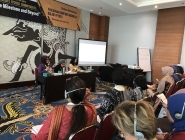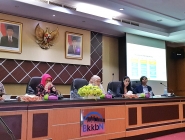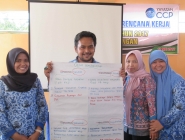At a Glance
Total Population
281 190 067 WHO data porta, 2023
Country Health Vision
to achieve "Universal Health Coverage" by 2045
Fertility
2.1
IDHS 2024
Population Social Status
9.82% (25.95 million people are poor)
Central of Bureau of Statics Indonesia 2017
Current Gaps
mCPR
42.3%
Track 20, 2023
Unmet Needs for FP
9.6%
Track 20, 2023
Advocacy Key Asks
Guiding FP Policies
Achievements
-

Indonesia in FP2020 Global #myFPstory Event
Details -

The First Motion Tracker stakeholders’ meeting in Indonesia.
Details -

Motion Tracker Validation meeting convened 16th August, 2019
Details -

Inception meeting with FP2020 Coordination secretariat members
Details -

Inception Meeting with the Head of National Family Planning Coordinating Board (BKKBN).
Details -
Kampung KB implementation and the development of online monitoring and reporting system
Details -
 Details
Details
Country Updates Reports
-
The Motion Tracker: FP2020 Commitments Activity Report July 2020
View | Download -
Summary Brief - Indonesia FP2020 Commitment Progress - Dec 2019
View | Download -
The Motion Tracker Validation Meeting Report, August 2019
View | Download -
Advocacy brief December 2019
View | Download -
Indonesia’s FP2020 Commitments: The milestone and Beyond
View | Download -
The Motion Tracker: FP2020 Commitments Activity Report July - December 2019
View | Download -
The Motion Tracker Mastersheet 2019
View | Download -
FP2020 Indonesia progress brief (Oct 2019)
View | Download